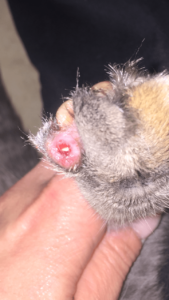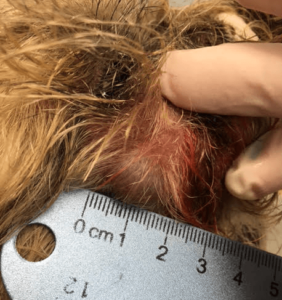An abscess is a pocket of pus surrounded by an area of inflamed tissue. Abscesses are common in dogs and cats, and can cause painful and uncomfortable symptoms. If left untreated, infected abscesses can lead to potentially serious health problems in pets.
Causes of Abscesses
Abscesses form when bacteria invade a wound and the body attempts to fight infection. They are commonly caused by injuries such as bite wounds, stings, skin abrasions, and foreign bodies under the skin. Other causes include ingrown hairs, dental issues, and swollen anal glands.
Symptoms of Abscesses
Please visit your veterinarian immediately if your pet displays any of the following signs or symptoms of abscesses.
- Redness and skin irritation
- A raised lump on the skin
- Pus discharge
- Pain
- Foul odor
- Hair loss
- Loss of appetite
- Limping
- Fever
- Lethargy
Diagnosis of Abscesses
Your veterinarian will assess your pet’s medical history and ask you a series of questions about the onset and severity of their symptoms. They will then perform a thorough physical examination to check for clinical signs of abscesses.
Diagnosis is often based on visual signs. However, your veterinarian may recommend other tests such as bloodwork and a urinalysis to evaluate your pet’s overall health. As part of the diagnostic process, a sample of fluid from the abscess may be examined in a laboratory setting. X-rays can also be useful for diagnosing dental abscesses in pets.
Treatment of Abscesses
In most cases, your pet will be sedated and your veterinarian will drain and clean the abscess. They will then prescribe medications such as antibiotics, anti-inflammatories, and analgesics to clear up infection and reduce pain and inflammation.
If the abscess is very deep, your veterinarian may recommend surgical removal to prevent the spread of infection. In the case of dental abscesses, tooth extractions or other dental work will often be required. Please follow your veterinarian’s treatment advice closely and administer all medications as instructed.
Prevention of Abscesses
Check your pet regularly for injuries, and visit your veterinarian if you notice signs of trauma or infection. It’s also important to take care of your pet’s teeth and gums to help prevent dental abscesses. Please speak to your veterinarian for more information about preventing abscesses in pets.



